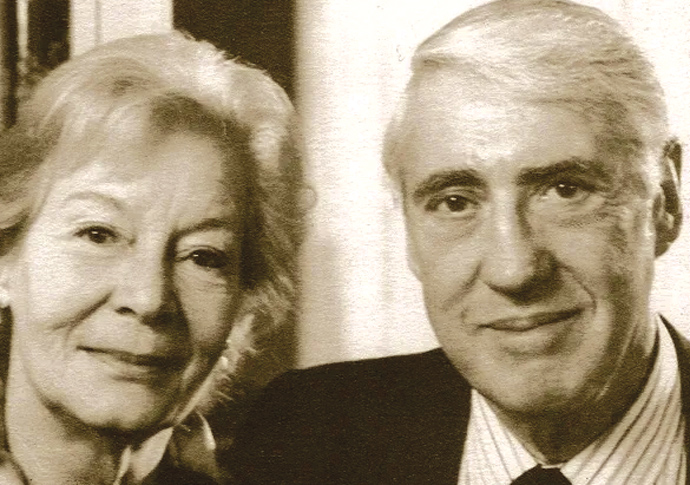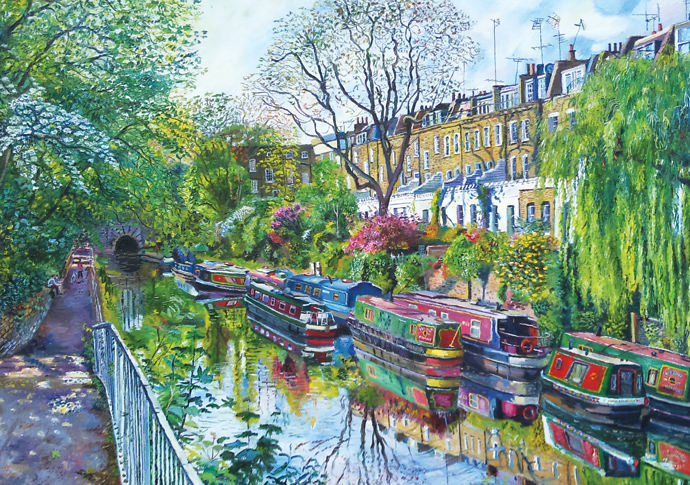Railing against the snakeheads
21 years on from the Potters Bar rail crash, Peter Gruner recalls how art comforted a grieving Nina Bawden
Thursday, 20th April 2023 — By Peter Gruner

Nina Bawden and Austen
WORLD-famous writer Nina Bawden, badly injured in a rail crash that killed her beloved husband, Austen, found peace and comfort in the aftermath from a painting of the tranquil canal opposite her home at the Angel, Islington.
The picture of Regent’s Canal, with houseboats, by artist Melissa Scott-Miller, first appeared in the New Journal’s sister paper, the Islington Tribune, back in July 2011.
Nina and Austen, who lived in Noel Road, would often walk the scenic canal path, taking in London Zoo and Little Venice, which stretched eight miles from the Paddington arm of the Grand Union Canal to Limehouse Basin and the Thames.
Holloway artist Scott-Miller, a member of the Royal Society of Portrait Painters, spent weeks sitting on the embankment to sketch and paint the stretch of waterway close to City Road Basin.
Sadly, a year after receiving the painting, Nina died aged 87.
Next month is the 21st anniversary of the Potters Bar rail crash. Seven people, six of them passengers, including Austen, were killed and 76 injured when a London to King’s Lynn train derailed at a faulty set of points at the Hertfordshire station on May 10, 2002.
Nina, an Islington resident for almost 40 years, was a former JP who was once shortlisted for the Booker Prize. She wrote a total of 47 books.
The painting – measuring two-and-a-half by three-and-a-half feet – was purchased by Nina’s daughter Perdita to help her mum recover from the devastating crash.
Perdita told the Tribune at the time: “It really is a vivid and beautiful work. Mum can’t get out much these days so having the painting reminds her of happy times down on the canal.”
The picture was given pride of place in Nina’s living room so that she could look at it as often as she liked.
But there was more bad news coming Nina’s way.

Melissa Scott Miller’s painting of Regent’s Canal
Perdita, in her mid-50s, had developed aggressive cancer and died in March 2012 just five months before her mum’s demise.
Nina’s book Dear Austen still resonates today. Written in 2005, it is both a love letter to Austen and a scathing attack on the rail industry.
Austen, a former head of the BBC World Service, was 75 when he died.
The couple had set off from King’s Cross station in a first-class carriage in an upbeat and happy mood. They were due to attend a friend’s 80th birthday party.
One aspect of the book not always highlighted is that she was grateful to the RAF Squadron leader Martin Rose, the only other passenger in her carriage, who virtually kept her alive following the crash. He appeared as Nina lay trapped between a seat and table in a “dusty” carriage.
Austen, who had been in a seat facing her, was already dead.
She wrote of Rose: “He couldn’t release me. He could see I was broken and bleeding. He made me as comfortable as he could and talked to me. He said I told him I didn’t want to stay, I was in too much pain, but he was determined I should. He talked to me to keep me breathing. And my treacherous body – this temporary habitation – made its own perverse decision and conspired with him against me.”
And then there was the nurse in the NHS hospital close to Potters Bar. Nina recounts that there appeared to be a shortage of nurses but there was one who was “wonderful”. She wrote: “When she was in the ward I felt safe as a child with her mother.”
But Nina flayed the “snakeheads” (her name for the unaccountable fat cats who gorge themselves on public contracts), who refused to take responsibility for the crash.
A memorial service was held at Potters Bar last year to remember those who died in the crash.
Deputy mayor of Hertsmere, John Graham, said they would “never forget those who lost their lives”.
In May 2011 Network Rail was fined £3m, having pleaded guilty at St Albans Crown Court to breaching health and safety regulations.
Unions are still concerned that cuts would mean accidents were “more likely”.
Kevin Rowan, head of public services for the Trades Union Congress, said “thankfully” nothing like Potters Bar had happened for some time due to investment in rail infrastructure.
“But our anxiety is, if you take the maintenance and rail checks away then you’re going to miss something on the infrastructure,” he said.
Network Rail said any proposals would be discussed and it would “not consider any changes that would make the railway less safe”.
• Dear Austen is no longer in print but available on Kindle or in digital form. Also, one of Nina’s most popular books, Carrie’s War, about children being evacuated in the Second World War, first published in 1973, is being republished by Hachette as part of its 50th anniversary.